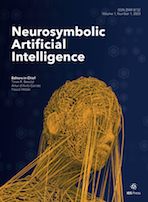Submitted by Pascal Hitzler on
Call for Papers: Special Issue on Neurosymbolic AI for Cyberphysical systems
A cyber-physical system (CPS) is a complex, integrated system that combines physical components with computational elements to interact with and control the physical world. CPSs are context-aware, meaning they can sense and adapt to their environment in real time. This enables them to gather data, process it, and make informed decisions based on the context, which is critical for applications like autonomous vehicles, smart infrastructure, and healthcare systems, where the system's actions must be responsive to changing conditions and user needs. In order to enhance the practicality of cyber-physical systems and enable their autonomy in critical scenarios, tackling the inherent uncertainty associated with real-world complexities and dynamic situations becomes highly crucial. One emerging approach with substantial potential in this regard is the integration of neural-based models with symbolic AI methods, known as NeSy (Neurosymbolic) AI. NeSy combines the strengths of neural networks (in perception) and symbolic models (in reasoning and explainability) to create a hybrid approach that can significantly enhance the robustness of CPS when dealing with the ever-present uncertainty of the real world, ultimately making them more reliable and effective in context-aware applications.
The goal of this special issue is to bring together a diverse range of ideas on how to develop, evaluate, and apply hybrid AI models based on NeSy techniques, with the aim of advancing the state-of-the-art in cyber-physical systems and other context-aware applications. By fostering interdisciplinary collaboration and exploring the potential of these innovative approaches, we seek to not only enhance the robustness of AI-driven systems in handling real-world uncertainty but also unlock new opportunities for solving complex problems across various domains. Through this collective effort, we aspire to contribute to the broader adoption of NeSy models, empowering them to drive transformative changes in the way we interact with, adapt to, and harness the potential of the ever-evolving real-world environment.
Deadline
December 7th, 2024. Earlier submissions will be processed as they come in.
Guest editors:
Leilani Gilpin, UC Santa Cruz, Department of Computer Science and Engineering
Marjan Alirezaie, Flybits Inc. AI Lab
Contact email for the guest editors: nesy-ai-cps@googlegroups.com
Topics of Interest
Topics of interest include, but are not limited to, the following:
- Technical innovations / Core NeSy topics
- Architectures: Neurosymbolic architectures for cyber physical applications
- Modelling: Models of cyber physical systems using a Neurosymbolic architecture
- Neurosymbolic AI for Context Inference
- Contextualized commonsense reasoning
- Context-awareness and counterfactual reasoning
- Interpretability and explainability:
- Transparency in the decision-making process in cyber-physical applications
- Defining Explainable AI in the context of cyber-physical applications
- Neurosymbolic AI and Society
- Addressing ethical and accountability concerns in NeSy models
- Human-Robot Collaboration:
- Integrating NeSy models in robots for improved human interaction in the context
- Collaborative task planning and execution
- Emotion recognition and affective computing in human-robot interaction
- Neurosymbolic Assistants:
- Designing intelligent virtual assistants with NeSy capabilities
- Multi-modal interaction in neurosymbolic-based chatbots and agents
- Personalization:
- User modeling and real-time context adaptation
- Applications of Neurosymbolic AI in:
- Autonomous vehicles
- Robotics
- Smart homes, smart cities, etc.
- Healthcare decision support
- Industrial IoT
- Learning and education
Guest Editorial Board
(to be completed)
Author Guidelines
We invite full papers, dataset descriptions, application reports, and reports on tools and systems. Submissions must be original and should not have been published previously or be under consideration for publication while being evaluated for this special issue. Authors can extend previously published conference or workshop papers - see the submission guidelines at https://neurosymbolic-ai-journal.com/content/author-guidelines for details.
Submissions shall be made through the journal website at https://neurosymbolic-ai-journal.com/. Prospective authors must take notice of the submission guidelines posted at https://neurosymbolic-ai-journal.com/content/author-guidelines.
Note that you need to request an account on the website to submit a paper. Please indicate in the cover letter that it is for the "Special Issue on Neurosymbolic AI for Cyberphysical Systems". All manuscripts will be reviewed based on the journal's open and transparent review policy and will be made available online during the review process.
